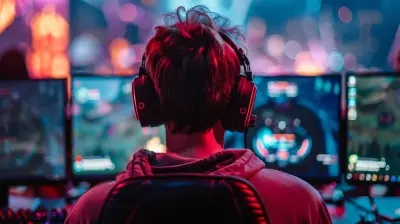Audience Power: How Backers Shape Kickstarter Game Development
28 September 2025
If you’re a gamer like me, you’ve probably noticed how Kickstarter has changed the way games are made. It’s like the Wild West of game development—a place where unique ideas thrive, bold risks are taken, and the audience, yes, you, become a part of the creative process. Kickstarter isn’t just about funding anymore; it’s about creating a bridge between developers and players, a bridge that’s stronger than ever because of one vital force: backers.
In this article, we’re diving deep into the world of Kickstarter game development, exploring how backers (a fancy way of saying people like us who pledge our hard-earned money) play a massive role in shaping these projects. Let’s break it all down, shall we?
What Is Kickstarter, and Why Does It Matter in Gaming?
Before we dive into the nitty-gritty, let’s zoom out for a sec. In case you’re new to the platform, Kickstarter is a crowdfunding platform where creators pitch their ideas to the public. It could be anything—art, tech, food, or, in this case, video games. If enough people back the project by pledging money, it gets funded, and the creators can bring their vision to life.For indie game developers, Kickstarter is a goldmine of opportunities. It’s almost like their stage to shout, "Hey world, look at this cool idea!" Without the need for big publishers breathing down their necks, creators have the freedom to experiment and innovate. 
Backers: The Lifeblood of Kickstarter Campaigns
Let’s be real—game developers wouldn’t get far on Kickstarter without backers. These are the people who throw their weight (and wallets) behind a project because they believe in it. But backers do so much more than just provide financial support.1. Funding the Dream
The most obvious role of backers is, of course, money. Kickstarter campaigns often have funding goals that range from a few thousand dollars to six or even seven figures. Without backers reaching deep into their pockets, these games might never leave a developer’s sketchbook. It’s like being the fuel in the engine of creativity.And here’s the thing: backers aren’t just donating money. They’re preordering games, snagging exclusive rewards, and sometimes even getting their names in the credits. How cool is that?
2. Providing Valuable Feedback
Ever feel like developers don’t listen? Not on Kickstarter. Backers often get early access to prototypes, alpha builds, or even just sneak peeks, and their feedback can drastically shape the game. Developers take their comments seriously because, well, backers are essentially their first customers.For instance, take the wildly successful Kickstarter game Hollow Knight. The developers, Team Cherry, incorporated backer suggestions to tweak gameplay, add new features, and fine-tune mechanics. It’s almost like backers are co-pilots, helping steer the ship where it needs to go.
3. Creating Buzz and Building Communities
Have you ever seen a Kickstarter campaign blow up overnight? That’s the magic of passionate backers spreading the word. They take to social media, forums, and even their group chats to share the projects they love. They’re like unpaid marketers who do it purely out of excitement.But beyond the buzz, backers also help form tight-knit communities around a game long before it launches. Discord servers, Reddit threads, and forums become vibrant hubs where fans exchange ideas, theories, and hype. It's kind of like being part of a club dedicated to building something awesome together. 
How Backer Influence Shapes Game Development
Okay, now that we know what backers bring to the table, let’s talk about how they actually shape the development process. Spoiler alert: it’s not just about money.1. Stretch Goals and Expanded Content
If you’ve ever browsed Kickstarter campaigns, you’ve probably noticed the stretch goals. These are basically bonus features or content that get unlocked once a campaign surpasses its initial funding goal. And guess who gets to decide which stretch goals are worth pursuing? Yup, the backers.For example, say the base funding goal of a game includes a single-player campaign. If backers pledge more, the developers might add multiplayer modes, additional levels, or even a new playable character. Backers essentially vote with their wallets, shaping the scope of the project.
2. Direction and Priorities
Backers’ opinions matter—a lot. Developers often conduct polls, surveys, or open discussions to figure out what their audience wants most. Should the game focus on story or gameplay? Should there be an easy mode? Should they add cats? (Hint: the answer to that is always yes.)Remember Divinity: Original Sin 2? That game was heavily influenced by its backers. Developer Larian Studios listened to feedback every step of the way, leading to one of the most critically acclaimed RPGs in recent years.
3. Accountability and Transparency
Unlike big publishers, indie developers answer directly to their backers. This creates a level of accountability that’s often missing in the traditional gaming world. Backers expect updates, milestones, and clear communication about where their money is going. If a project is delayed, developers better have a good reason—and a heartfelt update—to explain it.This dynamic keeps developers grounded and honest. It’s a partnership, not a transaction. Backers want to feel involved, and developers know that keeping them happy is critical for long-term success.
The Risks and Rewards of Backer Influence
Of course, it’s not all sunshine and rainbows. Backer involvement has its pros and cons, and it’s worth looking at both sides of the coin.The Rewards
When done right, backer influence can push a game to heights it might never have reached otherwise. Developers get funding, feedback, and a ready-made audience. Backers get to watch a game they’re passionate about grow and evolve, often with exclusive perks. It’s a win-win.The Risks
However, there’s a flip side. Sometimes developers overpromise to appease backers and end up stretching themselves too thin. Features can get delayed or dropped, leading to disappointment. Expectations can spiral out of control, creating pressure that no team could realistically meet. Let’s not forget the infamous Mighty No. 9 debacle, where sky-high promises ended in a game that fell flat.Why Backer Engagement Matters More Than Ever
In an era where gaming seems dominated by microtransactions and corporate greed, Kickstarter feels refreshingly human. It's a place where creativity and community come together to make magic happen. And backers? They’re the heart and soul of it all.As gamers, we often feel powerless against the tide of rushed releases and broken promises. But on Kickstarter, we do have power—the power to champion the games we want, influence their development, and help indie creators succeed. It’s a partnership built on trust, passion, and a shared love for gaming.
Final Thoughts
So, what’s the takeaway here? When you back a Kickstarter game, you’re not just funding a project; you’re joining a team. You’re shaping the games of tomorrow alongside the people who make them. It’s a unique, empowering experience that’s changing the way we think about game development.Next time you see a cool Kickstarter campaign, think about the role you can play in its success. Maybe it’s pledging a few bucks, offering feedback, or just sharing it with your friends. Either way, you’re making a difference. And honestly, isn’t that kind of amazing?
all images in this post were generated using AI tools
Category:
Kickstarter GamesAuthor:

Emery Larsen
Discussion
rate this article
2 comments
Antonia Bowers
This article astutely highlights the transformative influence of backers in Kickstarter game development. By fostering a collaborative relationship between creators and supporters, projects not only gain funding but also valuable feedback that shapes gameplay and narrative. This symbiotic dynamic challenges traditional development norms and underscores the evolving nature of game creation.
February 11, 2026 at 5:59 PM
Megan Daniels
Great article! It's fascinating to see how backers influence game development on Kickstarter. Their feedback and support truly empower creators, making the gaming community stronger and more connected. Excited for future projects!
September 29, 2025 at 4:14 AM

Emery Larsen
Thank you for your kind words! I completely agree—backers play a crucial role in shaping the future of game development on Kickstarter. Exciting times ahead!


